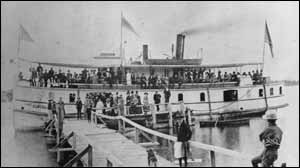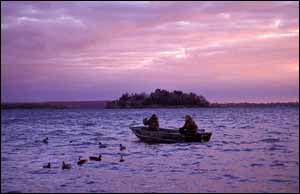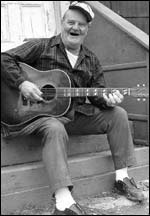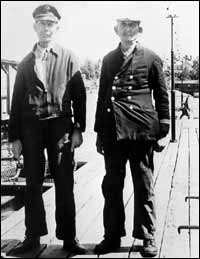

HUNTER GRIMES
"Babe Glad and the Slingshots"
Well, you know, the local legends of that time [early 1900s] were real characters and, and real old fashioned river rats. These guys were somethin' else. But the old timers that I can remember were like a fella named Babe Glad, he lived way up on Otter Creek and we used to like to go up there in the boats in the springtime. You could catch bullheads and sunfish and stuff like that pretty easy, and we thought that was a major accomplishment, you know,and you'd go up and catch a mess of bullheads. And Babe Glad sat up on top of a rock that was quite high and he could see the kids fishin' down there and one of the things that he did that was kinda neat is he made slingshots and he would sell "em for fifty cents to the kids that could come up with fifty cents. And these were lethal weapons. He made them out of surgical tubing? And, you know, the old fashioned forked stick and boy, if you saw Babe up on the rock and had fifty cents, you could always, you could do your fishin' and, 'Hey, Babe, you got any slingshots today?' He'd sell you a slingshot for fifty cents and boy, then you were armed and dangerous. But we spent an awful lot of time up in that end of the bay, partly because it was quiet, you know, and off the beaten path. There wasn't a lot of boat traffic and fishin' was pretty good and it was a neat place to monkey around, you know. There was muskrats and all kinds of birds and things and fun place to monkey around. But the old timers, the things they did, I guess, is what we wanted to do, and some of the pastimes that were really part of, part of river life in that day wasn't legal. It was, you know, like spearin' fish at night or even during the daytime. That's what we wanted to do.
| Picture Caption: Steam ferry "Algona," loaded with passengers at Ogdensburg dock, late 1890s. [Courtesy of St. Lawrence County Historical Association Collection] |

R. GARETH SERVICE
"Gimme a Beer and a Sandwich!"
My grandfather had a bar in the hotel [on the Canadian side]. And the tour boats would stop there with their people, and all it was was three-two beer that they sold in Ontario. That was the legal beer, but it was labeled beer, and he fixed up some tables in the lobby and through the dining room, and you were supposed to have a sandwich. You couldn't serve the beer unless you had food, and you're supposed to have a sandwich on the table. Well, my mother made up a whole bunch of sandwiches that weren't gonna get maggoty or smell and put "em in paper bags, and they were on the table. Well, I don't think you could've eaten one of them, 'cause they were there from spring till the season was over. And I think if anybody had tried to open one up, she'd probably taken a hand right off at the wrist. They didn't. They were just there, to meet, to cover the law. Just for show. You didn't go to eat, and of course, those people would drink that three-two beer and think they were havin' a helluva time.
MARIE TOUSANT
"Life on a Houseboat"
He [Chauncey Wheeler, my father] worked on some of the islands. He'd take care of their boats. They all had big house boats at the time, a good many of the summer people. I don't mean these little wooden boats. A good sized house boat was living quarters on 'em and usually it had the cook and a chambermaid with the guides. My father spent a number of years up the Rideau through the summer months. His people he worked for then were from New York. There was Marshall, Adams and Gibbs, three people, and they had a house boat, and they used to take it up to Jones Falls and leave it there for the summer and take guides with them and their cook and their help, all up, stayed up there for the whole summer. They were fishing, see, that's what these people used, that was their sport. They loved to fish.
DICK GARLOCK
"The Rumrunners and the Ladies Aid Society Social"
My grandmother was a WCTU, or Women's Christian Temperance Union, or whatever it was, and she had a cottage up here on the river by Point Vivian and Ted Welch and Joe Welch, they were bootleggers. And we always liked them, they were nice guys too. And pretty tough, you know? I mean, nobody'd want to mess around with them too much. Well, anyway, one day, while she had a meeting of the Ladies Aid Society there, see, they [Welch brothers] came in and stashed a bunch of liquor under this willow tree. And she saw 'em, so she called right up the revenuers or whatever you called 'em, and they came. Almost got 'em. They got the stuff, but they didn't get them. Well, my father and uncle were pretty worried about it because, you know, she's liable to end up dead if she's doin' stuff like that. And she saw "em on the street, and she told 'em, she says, 'You ever bring that rotgut stuff on my place again,' she says, 'and I'll make sure you do get caught!' Well, they laughed about it, see, they thought it was funny, this old lady turnin' 'em in, you know. But she did eventually turn them in and they did get caught.
"How About a Little Breakfast?"
I went down to Goose Bay, to camp there and Gene Russell. Gene was kind of a recluse, he lived by himself and he wasn't always too careful about some things. He'd always call me 'Big Boy,' he'd say, 'How ya doin' Big Boy?' You know how he'd talk, see? And he had a cap, wore that little Scottish cap, and he'd take it off to say 'hello' as he'd row by, ya know. When I stopped by this one morning at his camp, he said, 'How about a little breakfast?' And I says, 'Whadaya got?' Gene says, 'Oatmeal.' I looked over there and what he did was, he had like a saucepan like about that (8 inch diameter) with a handle on it and he put oatmeal in it, but he never took it all out, see. And he just put more in the middle and there was an edge that big that was all hard and just the oatmeal in the middle that was fresh. The rest was black! So, I say, Gene, whadaya do? Well, he says, 'When it closes up too much, I take it out and start all over again!' I said, Well, I've already eaten, so I'm sorry, I'm full. I don't really want any.
| Picture Caption: John Green and Royal [Bud] Garlock setting out duck decoys at sunrise off Grape Island, November, 1996. [Martha Cooper photo, TAUNY Archives] |

"More Characters Than People"
In Alex Bay, they've always said 'There's more characters than people,' and some of the oldtimers were quite some guys. There was one fella, his name was Albert Hartman, and Albert liked to drink pretty much. He was kinda a big fellow and he talked like this, he'd say, 'Well, you know, our chief of po-lice is Toots Gay-lord,' that's the way he spoke, see? Well, Albert one time was sittin' on a park bench down in town, and some fellas standin' around, and Doug Manning, who was kind of a dapper, well dressed man, quiet, didn't say much, was sitting there with him and one of those big, new, silver DC-7s , or whatever those airplanes was, went over. And Doug said, in kind of a quiet voice to Albert, he said, 'Albert, how'd you like to be up there with that fella?' And Albert says, 'Well, I'd rather be up there with thim than without him!'
MURRAY TAIT
"Three Blind Pigs"
There was a lot of places here, little houses you could go into if you were known, and have liquor, drink it, and everything. Blind Pigs, they called them...We had 'em downtown. There was one, two, three, three good ones in town, four, I guess. And they'd usually have a slide in the door and you rapped on the door and they opened the slide. And if you were known, you could come in or if you knew somebody and they had sent you, maybe you could use their name and get in and have something to drink If you were sent by somebody, it had to be somebody pretty good that they knew or you wouldn't get in. There were usually pretty good people that run 'em, well-known people and they knew what to do and how to make 'em run. The one down on the end of James Street, the upper dock, that was a good one I remember. They had a big room, good sized room, and in the center was a table like this [dining room table] and there was a big rug on the floor. And if you walked in there and you wanted a drink and they knew you, you moved the table and rolled the rug up, and here's a trap door, and there was a vat down in there with ice in it and drinks. You could drink whatever you want, and they rolled the table back and you sat there and had your beer. But it was hid so that you could walk in and you wouldn't know that it was anything except a place to sit and have somethin' to eat.
| Picture Caption: Sid Patterson at home in Alexandria Bay, 1970s. [Watertown Daily Times photo] |

SID PATTERSON
"Life on Lake of the Isles"
Yeah, I've had some great times with my dad and my gramp over in the Lake of the Isles. I was born and brought up over there, pret' near. I stayed there for two years all alone with my dogs. That was before I was married. I went over and stayed in the log, well it wasn't a log cabin. It was the old Harden shanty. I went over there and I stayed right there all winter, cuttin' my wood and trappin' my traps and fishin' through the ice. And I killed foxes. I had a fox hound and I had a span'l that used to be with me. Then on Friday nights and Saturday nights I used to go up to Thousand Island Park to the Firemen's dances up there. They weren't all Firemen's dances, but they had a dance "bout every Saturday night. Eddie Root and Charlie Heath and Cansley Hunt used to play--Eddie Root played the fiddle and boy he was a good one, too. Cansley Hunt played the five string banjo and Charlie Heath used to play the piano. They had suppers there. Yeah, they'd have an oyster stew and they'd have a big ham supper. There was Joe Patterson, Orb Patterson and all the Slates and, oh, used to be the greatest time up there.
"Spring Tonic"
My dad used to make a spring tonic. We all used to drink it, a great big cup full. It was made out of popple [poplar] bark. I think he used to put juniper in it. Juniper is supposed to be poison but it never poisoned us. There was prickly pear he used to put in it and, I don't know, two or three different kinds of bark. He used to steep it all up and then he'd strain it and he'd have a great big dish full of it setting in the cellarway. Well, it was cool in the cellar. We had a big dipper hanging up, everybody drinking out of a certain cup. Everybody drank out of the same cup them days. It was good. We'd take a drink every time we'd go by there. It wasn't bitter or nothin'. It was just a spring tonic. That's what would keep you from having colds. We had it every year.
"A Good Dog"
You can take a person and have thirty people walk right up through that road there, and if you've got a dog and let him loose, like the dog that's with me all the time, he'll pick up a scent right out of the air and follow it right in amongst, right in Watertown if you'd stop all the traffic and everything. He'd pick your scent right out of the air right there and on things that you brush against, like pieces of grass or a telephone pole or anything. He'd smell it and he'll follow you and pick you up and find you. Your scent lingers in the air for so long. That's what I've read. A fellow says, 'How can a dog tell the front end of a fox track from which way to go, whether to go this way or that way?' 'Well,' a fella says, 'You ever smell of your heel?' And he says, 'Yes.' 'Then smell under your toes and see which is the strongest.' Well, there you are. Maybe there's something to it, I don't know. Them are things that I've read.
"I Catch My Share"
They claim the fishing ain't as good as it used to be. I can go out and catch as many fish as I want to and the fishing guides catch lots of bass, lots of northern pike, and there's lots of muskellunge on the river. I catch my share of them all the time, but some of these people want to catch four or five a day. Well, they got it now so's I think you can catch one fish per person this year a day--used to be two. I don't go out to catch ten, twelve fish a day. If I can catch one or two fish a day when I'm tip-upin [ice fishing], I'm satisfied. That gives Iva and I and our family plenty to eat. Some people want to go out and slaughter them, you know. Well, I can't see that, slaughterin' them.
FAIRMAN "SAMPY' SUTTON
"The Giveaway Sandwich"
One day (this was a long time ago now) Dick [Garlock] and I and our sons was huntin' ducks in White's Swamp. My young dog Sid had been workin' real hard all mornin' and, after we'd killed 60 or 70 ducks, we got ready to go home. It was about noon and I says, I'm gonna take the ducks out. Dick says, 'Are you crazy? In the middle of the day, take them ducks out?' I said, Did you ever see a game warden that wasn't in the diner at noontime? But I was hungry and hadn't brought my lunch. Dick's son Matt likes peanut butter and natural food and all that stuff, and had some sandwiches. So Matt said, 'Here, have one of my sandwiches.' Well, if you've eaten natural peanut butter, it doesn't go down like creamy. So, I was kinda chokin' on it, ya know, and was tryin' to get it down and he gave me some kind of juice, I don't know what it was. And I drank that and I kinda made a face and I says, Well, I'm gonna take the ducks in and I'll be back. So I took my son with me and took 30, 40 ducks, put them over our shoulder, and started in. Well, we got to the road and we're walkin' up the road to where we'd parked and my son's got the bag of ducks. As we got near our truck, I could see a strange truck there, so I told my son to throw those ducks into the ditch and cover 'em over and we walked right on up there. When we got there, all of a sudden they was around us, game wardens, and one says, 'Have a good shoot?' I says, Pretty good, yup! So he checks my gun and all my shells and goes through all my box and everything and checks me out. Then he says, 'By the way, where's your ducks?' Well, I say, I left them in there and I'm going back later. 'Well,' he says, 'I see you leave with 'em.' I says, What do you mean? 'Well, when you left the blind, you had a bag of ducks.' Well, I said, I told you I left 'em in the woods and I'm goin' back later. He said, 'By the way, what was the matter with that sandwich you was eatin'? And I says, Whadaya mean? 'Well,' he says, 'I saw you eatin' on that sandwich and you couldn't hardly get it down.' I says, How'd you know that? He pointed over to his big, long telescope. With that thing he could see the writin' on my gun! So, I says, Oh, boy! And I had to wait till after dark to go back and get the ducks. That was close!
Picture Caption: "Captain' Edgar J. Hoadley and brother John Henry Hoadley on the lower town docks in Alexandria Bay. [Courtesy of Dan Hoadley] |

JUDY KEELER
"Do You Want to Row or Do You Want to Bail?"
One of the characters I heard Bill Hartman, who came from Wellesley Islad, tell about was his grandfather, who was William Keppler, and it seems that the Kepplers have lived on Wellesley Island for a long time and they had a farm and they did a lot of hunting and fishing and so forth. Well, it seems that the peddlers figured out that the Keppler farm was just the place to go right around dinner time, because Old Man Keppler was really good for an invitation to dinner, much to the chagrin of his wife. So, one Friday afternoon this peddler came and got himself at the farm just at dinner and got himself an invitation and, so, as they were finishing their pie and coffee, he says, 'Well, Mr. Keppler, would you be going to Alex Bay tomorrow?' and Mr. Keppler said, 'Well, yeah, it's been a while, it looks like a good day to go.' So, there was no bridge, of course, or no motor boat, so their mode of transportation was the St. Lawrence River skiff. So he said, 'Sure, you can go with us.' And so the peddler was all set, because he had a nice lodging and he'd already had dinner and he was gonna have breakfast the next day. They woke up and it was a beautiful day and they went down to the boathouse and up on the ramp there was this beautiful mahogany St. Lawrence River skiff. And Old Mr. Keppler looked at the guy and he started to pull the boat out and he says, 'Son, do you want to row or do you want to bail?' The peddler looked at that boat and he knew wooden boats leaked sme and he said, 'Well, I guess I'll bail,' 'cause certainly this one wasn't gonna leak. So they began to put the boat in the water. Well, a skiff is designed with a drain hole in the stern, so you can let out rain water or water from heavy seas. So Old Man Keppler just sorta pocketed the plug and slipped the boat in the water. He then started rowing the three miles down river with the current. He's basically steering the boat to Alex Bay! They hadn't gotten far and the water's comin up over the peddler's feet and he bailed furiously all the way to town. Well, when they got there, they pulled the boat out and put it up on the dock. They did their business and met like they were supposed to and went to push the boat back into the water. Then Keppler looked at the peddler and said, 'Well, son, do you wanna row or do you wanna bail?' Remembering his experience of bailing all the way in, he said, 'Well, Mr. Keppler, I think I'll row us back.' So as they got into the water, Old Man Keppler sits in the back and gets out his newspaper and, being careful not to be seen, sneaks the plug back into the drain, and the guy starts rowing. Well, by that time about a 20 mile an hour wind has picked up, and he's going against the current upriver, and it took him two and a half hours to row back. By that time the peddler had had a good lesson. For years afteward, Bill Hartman said that every time anyone got to the Keppler boathouse, when you got in the boat, someone always asked, 'Do you want to row or do you want to bail?'
DEAN SENECAL
"Some Really Big Fish"
My father was tellin' me years ago that he was out there with one of his uncles, and they didn't have that big of a boat. I guess my grandfather was with them too, and they had a sturgeon on there, probably ten feet long, and they, they didn't get it in the boat. They finally ended up losin' it, yeah. But most of them men had pretty good sized boats, and once you got 'em in the boat, they had a big gaff hook and you could handle it. One man alone, though, if he had a two hundred pound sturgeon, it'd be kinda hard! But a lot of times there'd be two guys in the boat. I can remember when we was kids. hell, just one guy, he's been dead for years, Boodie Joyner, him and another old guy, they used to catch a lot of sturgeon in the spring. That's when they were thicker, and they had these big wooden fish cars they'd keep 'em in, you know, until they had so many and they'd dress 'em off and take 'em over to Redwood and ice 'em down and ship 'em to to New York. I mean, you just didn't bother shippin' one fish. You'd wait 'til you got enough to make it worth your while, you know.
©2001 Traditional Arts in Upstate New York